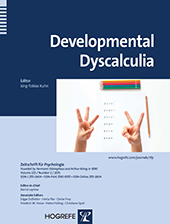“Hotspots in Psychology”
A Special Issue of the Zeitschrift für Psychologie
Focus of the Special Issue, Aims, and Scope
Research synthesis techniques such as systematic reviews and meta-analyses have become standard methods for aggregating the results from thematically related research in psychology. They can be used to describe the state of the art in a research field, to test and/or compare theories, and to derive conclusions about the effectiveness of interventions. Ideally, research syntheses use transparent procedures to find, evaluate, and aggregate the results of relevant research. Procedures are explicitly defined in advance to ensure that the exercise is transparent and replicable. This practice is designed to minimize bias and increase the trustworthiness of findings. Consequently, well-performed research syntheses may decisively contribute to shaping and/or resolving hotspot debates in psychology and beyond.
The overall aim of this special issue is to address hotspot topics in all subfields of psychology and related areas with the aid of research synthesis methods. The topics covered should make use of the following research approaches:
- •Systematic reviews on topics currently being debated in any subfield of psychology.
- •Meta-analyses on hotspot topics in psychology.
- •Meta-analytic replications and extensions of previously published syntheses, for example, by applying more recent approaches and/or more recent primary studies.
- •Methodological advances in research synthesis methods addressing contemporary topics in psychology, such as multivariate/multilevel meta-analysis, Bayesian approaches, meta-analysis with mixture models, study quality appraisal tools, etc.
How to Submit
There is a two-stage submissions process. Initially, interested authors are requested to submit extended abstracts of their proposed papers. Authors of the selected abstracts will then be invited to submit full papers. All papers will undergo blind peer review.
Stage 1: Structured Abstract Submission
We encourage interested authors to submit a structured abstract of the planned manuscript before submitting a full paper. The goal is to provide authors with prompt feedback regarding the suitability and relevance of the planned manuscript to the special issue.
The deadline for submitting structured abstracts is September 30, 2015.
Feedback on whether or not the editors encourage authors to submit a full paper will be given by October 30, 2015.
Submission guidelines for structured abstracts:
Structured abstracts must not exceed four pages and encompass information on each and every of the following headings: (a) Background, (b) Objectives, (c) Research question(s) and/or hypothesis/es, (d) Method, (e) Results, (f) Conclusions and implications (expected).
Before developing the structured abstract, authors are strongly advised to get acquainted with the meta-analytic reporting standards (MARS) recommended by APA, which can be found here: www.apa.org/pubs/authors/jars.pdf
Structured abstracts should be submitted by e-mail to both guest editors: mailto: erdfelder@psychologie.
Stage 2: Full Paper Submission
For those who have been encouraged to submit a full paper, the deadline for submission of manuscripts is January 31, 2016. Important: All papers should adhere to the meta-analytic reporting standards (MARS) recommended by the APA (see above). Full manuscripts will undergo a blind peer-review process.
Submission guidelines for full papers:
Maximum 8.500 words (approx. 60.000 characters, including spaces) in 12-point Times New Roman font, formatted in APA style (www.apastyle.org/), A4 paper format, 1 inch margins. Figures should be in grayscale only.
The title page should contain title, authors, and affiliations, including a complete address for correspondence (including e-mail address). An abstract of 150 words or less and a list of up to five keywords should follow the title page.
On page 3 of the manuscript, repeat the title, but not the names, to permit anonymity during the reviewing process. Please do not include any footnotes at the bottom of the pages or at the end of the text.
Timeline
- •September 30, 2015: Extended abstract submissions due
- •October 30, 2015: Feedback to authors of extended abstracts
- •January 31, 2016: Full paper submissions due
- •April 30, 2016: Feedback to authors of full paper submissions
- •July 31, 2016: Revised manuscripts due
- •August 31, 2016: Editorial decision about acceptance/refusal of revised papers due
- •January 2017: Publication of special issue
About the Journal
The Zeitschrift für Psychologie, founded in 1890, is the oldest psychology journal in Europe and the second oldest in the world. One of the founding editors was Hermann Ebbinghaus. Since 2007 it is published in English and devoted to publishing topical issues that provide state-of-the-art reviews of current research in psychology.
For detailed author guidelines, please see the journal’s website at www.hogrefe.com/journals/zfp/.



